Index relies entirely on the support of donors and readers to do its work.
Help us keep amplifying censored voices today.
Donald Trump, who controversially called for a temporary ban on Muslims entering the USA, will not be banned from entering the UK after a debate over whether he should be allowed to enter the UK. In September 2015, Tyler, the Creator, an American hip-hop artist known for his controversial lyrics, did not fare so well.
On 26 August 2015, the musician was banned from entering the UK because of words he had penned for songs released in 2009. That day, Tyler explained the situation on Twitter, saying: “BASED ON LYRICS FROM 2009 I AM NOT ALLOWED IN THE UK FOR 3-5 YEARS (although I was there 8 weeks ago) THAT IS WHY THE SHOWS WERE CANCELLED.”
Speaking to Vice at the time, Index on Censorship’s chief executive Jodie Ginsberg said: “The British government has talked repeatedly in recent months about the importance of free expression and yet shown again and again through its actions that this commitment is half-hearted. Free expression includes allowing those whose speech others find offensive to express themselves. Tyler, the Creator, should be allowed to perform.”
Tyler’s lyrics have a tendency to push buttons, with his adopted alter ego Wolf Haley spitting rhymes about raping pregnant women and using a hefty variety of slurs. However, he stands firm on the fact that his lyrical content in no way a represents him as an individual and what he believes. In an interview with the Guardian, he said: “The thing that irks me about it is that the paper saying I am denied entry to UK clearly states that these songs were written from [the perspective of] an alter ego — which means they obviously did some research on these songs that they’re detaining me for.”
Additionally, in one of his most popular tracks, Radicals, he opens the song saying: “Hey, don’t do anything I say in this song, okay? It’s fuckin’ fiction. If anything happens, don’t fuckin’ blame me, white America, fuck Bill O’Reilly.” Seconds after the disclaimer, the MC launches into a tornado of aggressive bass and lines about defying what others think of him.
Tyler wasn’t the first rapper to be banned from the UK; both Busta Rhymes and Snoop Dogg have been denied entry because of convictions for criminal offences in the US. However, he is the first to be denied due to the content of his art.
Index on Censorship has teamed up with the producers of the award-winning They Will Have To Kill Us First to create the Music in Exile Fund to support musicians facing censorship globally. You can donate here, or by texting “BAND61 £10” to 70070 to give £10.
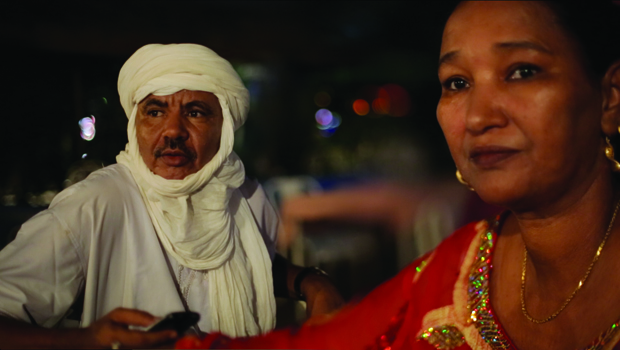
Malian musician Fadimata “Disco” Walet Oumar, with her husband, as featured in They Will Have To Kill Us First
UPDATE: The concert in Timbuktu did not go ahead as the Malian president Ibrahim Boubacar Keita declared a 10-day state of emergency following the deadly hotel attack.
Johanna Schwartz, director of They Will Have to Kill Us First, a documentary about exiled musicians in Mali, has spoken out on the attack and deaths at a hotel in the Malian capital, Bamako, today. The director has been trying to get in touch with the musicians covered in the documentary. She believes that a big concert in Timbuktu, planned for tomorrow, is still going to go ahead. Islamists have tried to stop music being played in Mali over the past few years, after they took control of parts of the country and declared it against sharia law. Many musicians fled the country.
Schwartz said: “My inbox has been flooded this morning with people wanting to know if Songhoy Blues, Disco or Khaira Arby are caught up in the hotel attack in Bamako. Songhoy Blues are right now in Paris, where they were supposed to perform this week. I wish I could say they were ‘safe in Paris’ but we all know that’s not true. Bataclan, the music venue that was attacked, is exactly the kind of venue Songhoy Blues are getting booked into these days. Khaira Arby is not in Bamako either, but in Timbuktu where a concert is planned for tomorrow evening. This will be the biggest concert in the city of Timbuktu since the music ban. (And much bigger than the street party gig that Khaira organised last year, which I filmed.) I just heard that the concert will indeed go ahead.”
She added: “An act of enormous courage from all involved. I think more than ever we need to take our cues from these great musicians, who resist these horrific attacks with every molecule in their body. They are wilfully defiant, but peacefully so. We don’t have to accept what these terror groups are trying to force upon the planet. But crucially, we need to understand why those who are accepting it are doing so. I just got off the phone with our local producer in Mali, he is calling Disco [musician Fadimata Walet Oumar] now to see where she is. A couple of his friends work at the hotel that is under attack as I type. He can’t get through to them on their phones.”
Index on Censorship has established a fund for musicians in exile in conjunction with the team behind They Will Have to Kill Us First.

Songhoy Blues
To mark the launch of the Music In Exile Fund, Index on Censorship has compiled a reading list of articles that have appeared in the magazine since 1982 and deal with censorship and music. We are offering these articles — which are normally held behind a paywall — for free.
Index on Censorship launched the Music In Exile Fund in partnership with the producers of They Will Have To Kill Us First: Malian Music In Exile – a documentary that follows musicians in Mali after the 2012 jihadist takeover during which music was outlawed. One band’s story featuring heavily in the film is Songhoy Blues, who are just one of many to feature in the Music In Exile Fund playlist.
The fund will contribute towards Index on Censorship’s Freedom of Expression Awards Fellowship, a year-long programme to support those facing censorship.
You can donate to the Music In Exile Fund here.

From the Autumn 2010 issue of Index on Censorship magazine. Subscribe.
Marie Korpe and Ole Reitov have been tracking the music censors and the censored for more than a decade. They reflect on the tactics of modern censorship
When we founded Freemuse ten years ago, our aim was to defend freedom of expression for musicians and composers. Since then, we have documented music censorship in more than 100 countries. At first, we were not aware of the size of the problem, but the longer we have worked in the field, the larger the challenges become. Maybe we are still only seeing the tip of the iceberg. While more journalists have got music censorship on their radar and a number of musicians have benefited from our support, it is still rare to find records of music censorship and violations of musicians’ rights to freedom of expression in reports from Amnesty, Human Rights Watch and other global free expression watchdogs.
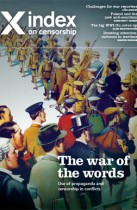
From the Spring 2014 issue of Index on Censorship magazine. Subscribe.
Some homophobic lyrics in rap and reggae incite hatred and violence,
agree campaigners Peter Tatchell and Topher Campbell. But is
censorship the answer? First, Peter Tatchell explains why education will
help. Then Topher Campbell tells Alice Kirkland where he would draw
the line
Along with misogyny, homophobic lyrics have long blighted some rap and reggae music. Eminem and Buju Banton, among others, have found themselves in the firing line for their incendiary anti-gay hate music, ranging from rap songs containing insults like “faggot” to tracks that overtly glorify and encourage the murder of lesbian, gay, bisexual and transgender people.
Homophobic hate speech is wrong, regardless of whether it is expressed by a bully in the street or by a singer.
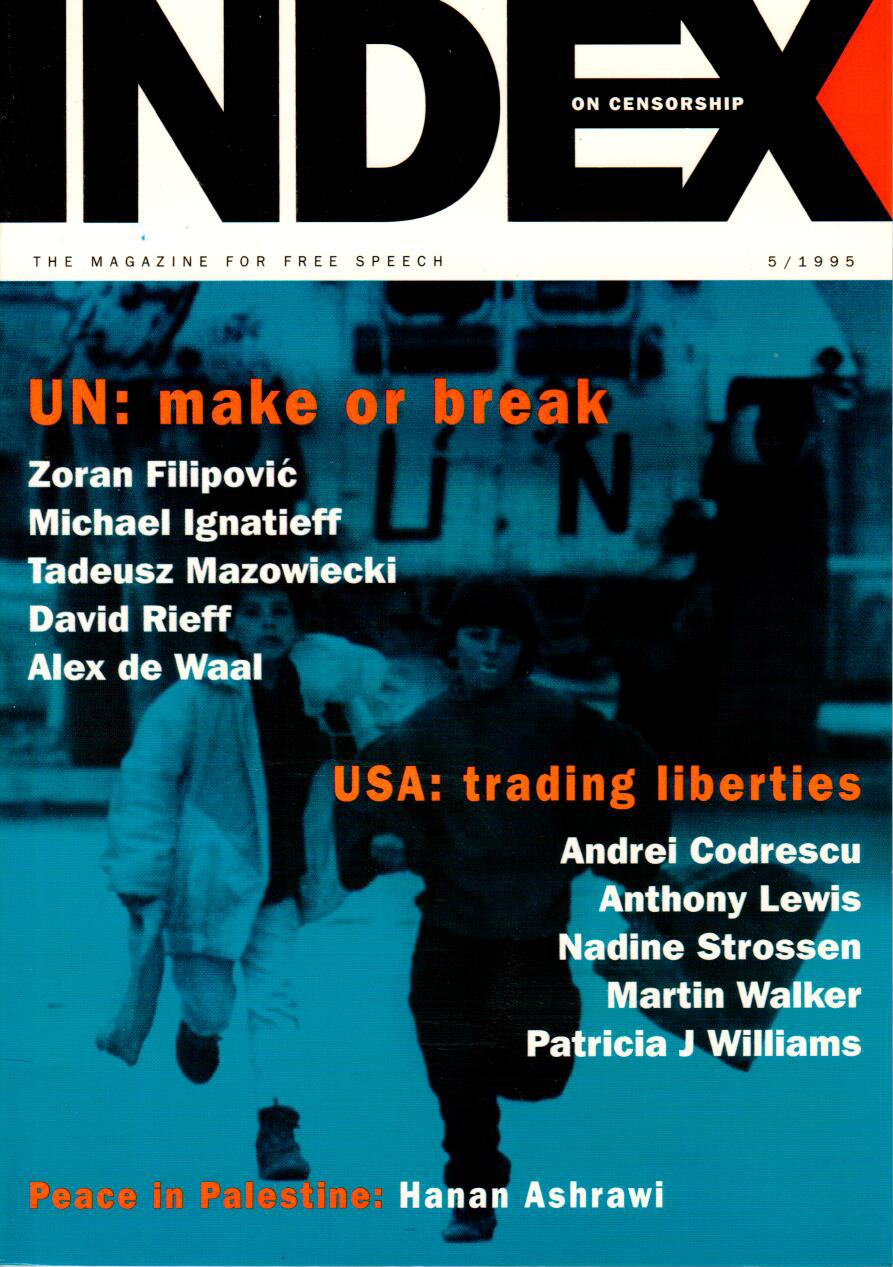
From the Autumn 1995 issue of Index on Censorship magazine. Subscribe.
To be young, alive and making music
Valrie Ceccherini writing in 1995 as part of a series focusing on the voices of those silenced by poverty, prejudice and exclusion
“My life has changed totally since the war,” says 20-year-old Ermin. He speaks of “the constant presence of death” with resignation. “I live shoulder to shoulder with death. Every time I go out, a missile could kill or wound me. Lots of my friends are dead. I think of them every day and 1 know 1 could join them at any moment. I’ve learned to live with this fear for three years now; there was no choice. I know it’s changed me. I’m harder, braver – or maybe I’ve just gone mad. Everybody here’s changed: everybody’s gone mad. You can’t help it after three years shut up in this hell.”
Emir is a slight youth of 17. “I used to spend most of my time away
from home, out with my friends. Now I scarcely ever leave home. It’s too dangerous.”

From the Autumn 2010 issue of Index on Censorship magazine. Subscribe.
Will Self on God Save The Queen
In the summer of 1977 I was 15 years old and wore an old tropical linen jacket I’d bought in a charity shop for a quid. It wasn’t so much off-white as ruinous, and it matched the colour of my shoes – winkle-pickers I’d painted myself using some kind of weird leather paint. Naturally I had to lie on my skinny rump to force my El Greco feet through the eight-inch ankles of my drainpipe jeans. Given all this sartorial mayhem it goes without saying that I absolutely concurred with the Sex Pistol’s front man, Johnny Rotten, when he sang, “God save the queen / The fascist regime”. Admittedly the causal connective “it’s” was lost in all the filth and the fury of his delivery, but we knew what he meant.
Actually, I can barely remember the circumstantial pomp that went into the celebration of the Queen’s Silver Jubilee, all I can recall is the Sex Pistols’ treasonable ditty, and the fact that it was banned from being played on the radio. At least I’m certain it was banned from the BBC’s Radio 1.
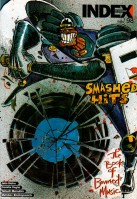
From the Winter 1998 issue of Index on Censorship magazine. Subscribe.
Mark Ludwig for Index on Censorship on how the Nazis used music as a propaganda tool in the service of its doctrine of racial purity and superiority. Composers and musicians who did not fit the formula found themselves In the camps
In the 1920s, Weimar Germany was home to a rich and diverse mix of artistic and political movements. Composers stretched the boundaries of, and in some cases charted new courses for, classical music. Zeitmusik (music of the time), the 12 tone system and jazz were part of a new and excitingly diverse web of musical movements. As Hitler and the Nazi Party assumed control of Germany, the arts and the political climate were affected. Under the Nazi dictatorship, the arts – particularly music – were used as tools for indoctrinating and controlling the German nation with an ideology of national superiority, suppression and racial hatred.
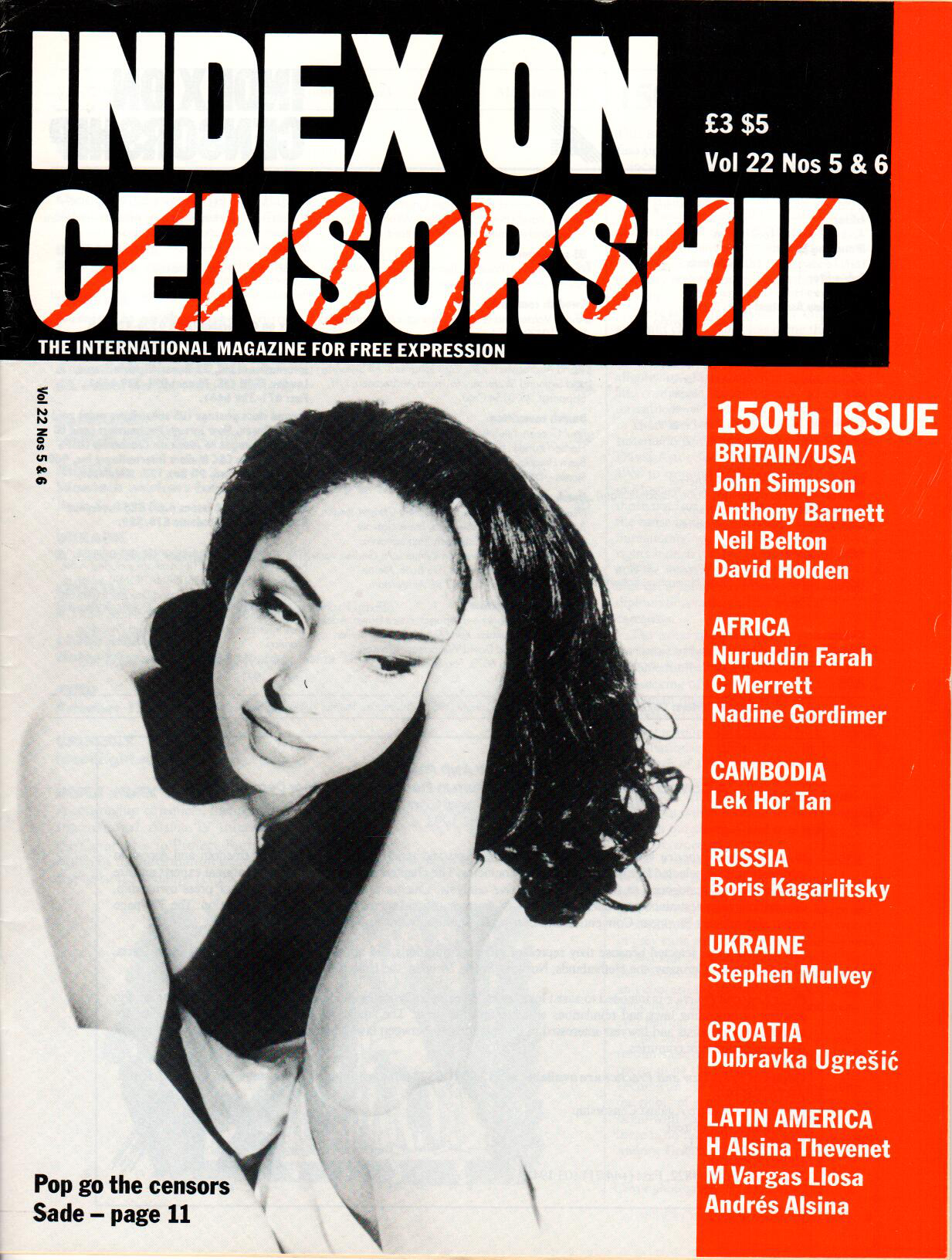
From the Spring 1993 issue of Index on Censorship magazine. Subscribe.
David Holden for Index on Censorship in 1993 on how anything — well almost — goes on the UK pop scene, but in the USA it’s a different story with Ice-T and the rappers sending shivers down parental spines
“Big boys bickering/fucking it up for everyone,” goes Paul McCartney’s 1992 song Big Boys Bickering. It’s an ecological song; the big boys bickering were the people at the Rio Earth Summit. About the song, McCartney has said: “When you talk about a hole in the ozone layer, you don’t talk about a flipping hole in the ozone layer, you talk about a fucking hole in the ozone layer. I know it might upset some of my fans, but I’m an artist, and I’m 50 years old and I think I can say what I like.”
Not on MTV America, Paul. According to the pop video channel, The Greatest Living Songwriter — faithful husband, caring parent, concerned citizen — is once again unsuitable for the youth of the USA.
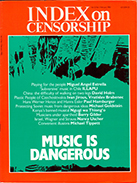
From the Winter 1983 issue of Index on Censorship magazine. Subscribe.
Vratislav Brabenec and Ivan Jirous tell the story of The Plastic People, a rock band which was seen as a threat by the Czech authorities during the Cold War
“Why should music be censorable?” asks Yehudi Menuhin on another page. Elsewhere in this issue the reader will see that in some parts of the world even certain musical instruments can be declared taboo by this or that military dictatorship. In Czechoslovakia since the early seventies it has been chiefly rock music that arouses the ire of the authorities – and those who insist on playing it find themselves not just banned but imprisoned.
Ah, but of course, one might say: if you set out to be a protest singer in a society ruled by a one-party dictatorship, what do you expect? The trouble with that line of argument is that The Plastic People of the Universe and the other rock groups with similarly strange names were not protest singers at all.
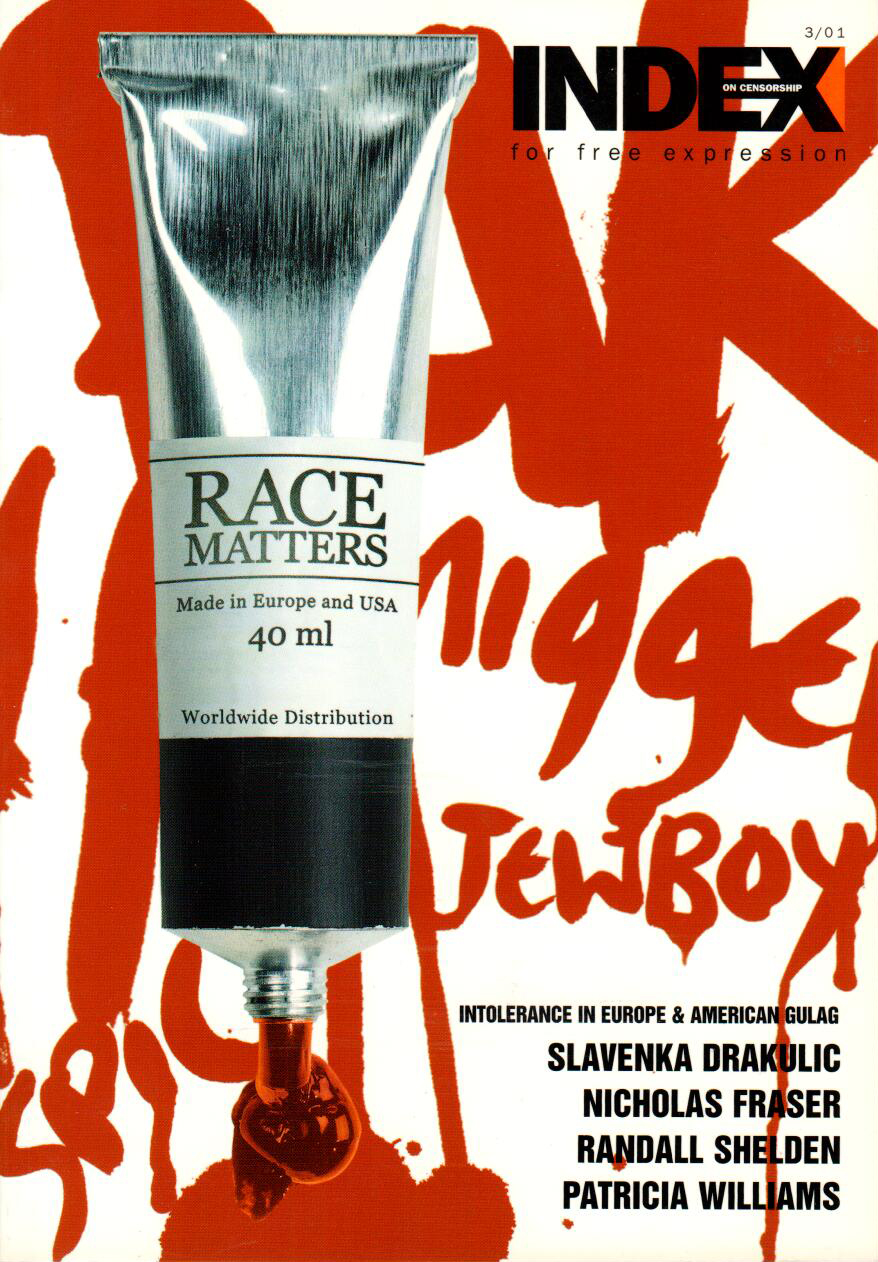
From the Summer 2001 issue of Index on Censorship magazine. Subscribe.
Aided by the Internet, racist music has made inroads on European youth culture, says Heléne Löow
It was in the first half of the 1990s that White Noise music became the symbol of the growing racist subculture around Europe. Between 1990 and 1995, the music industry, then in a period of rapid expansion, gradually replaced the badly copied tapes, records that were hard to come by and roughly photocopied magazines with professionally produced CDs. The number of CDs on the market grew steadily; production became increasingly professional with Swedish White Noise record labels among the world’s most active producers.
By 1996, the first phase was over; for the next two years, production maintained its levels but there was no significant increase. By 1999, however, it was once more on the rise, along with white-power magazines, and other propaganda material.
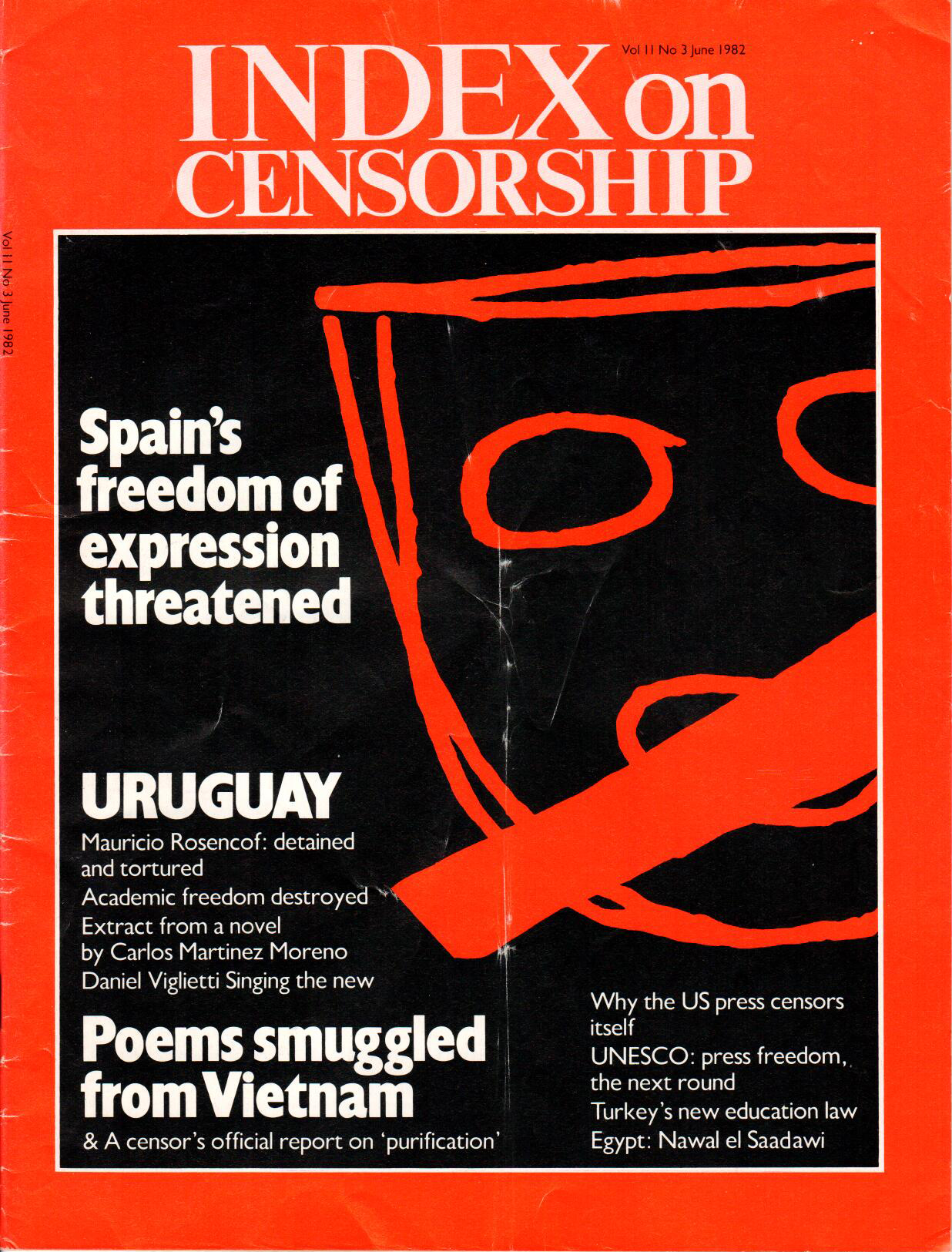
From the Summer 1982 issue of Index on Censorship magazine. Subscribe.
One of Uruguay’s best-known singers talks to Daniel Viglietti about his life in exile
I was first invited to this conference to participate, together with the Uruguayan writer Eduardo Galeano, in an event in which song and literature would work together, bringing together a man like Galeano, who writes with a pen, with someone like me, who, if you would allow me, writes with a guitar. Later on, the organisers phoned me to ask if I would add some thoughts about exile. I agreed to that, since I have been living in that situation now for eight years and one month. Given the nature of this occasion, I have attended some meetings handicapped by the fact that I do not speak English. For this kind of contribution, I need my mother tongue, Spanish. Today I have the advantage of a translation so I am going to throw out some ideas about the exile in which hundreds of thousands of Uruguayans have been living for eight, nine or even 10 years.
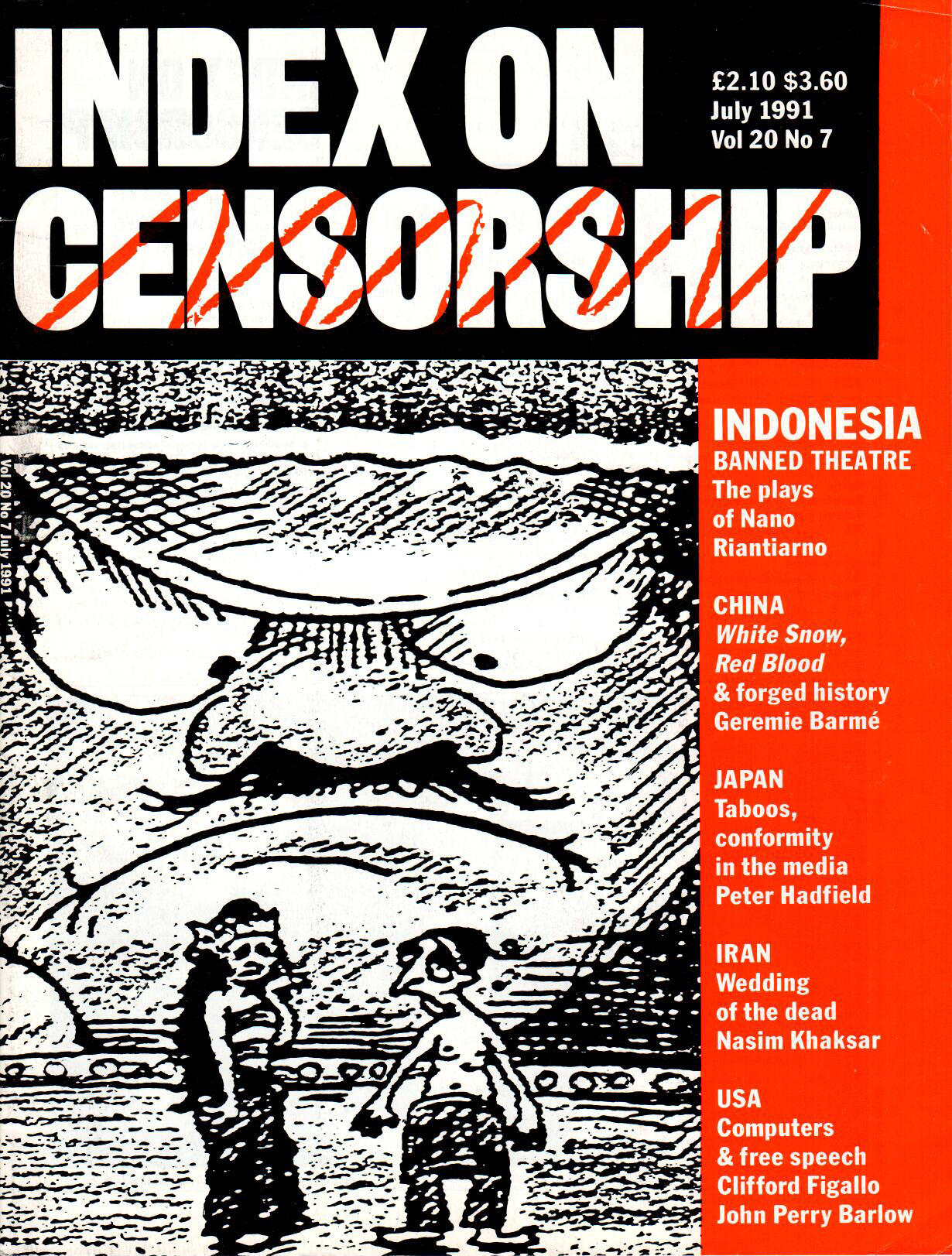
From the Summer 1991 issue of Index on Censorship magazine. Subscribe.
Nick Caistor on the Report of the Commission for Truth and Reconciliation, which revealed for the first time the details of how Chilean musician Victor Jara died
Victor Jara was one of the best-known singers and theatre directors during Salvador Allende’s Popular Unity government in Chile. From 1970 to 1973, Jara sang for the people and put on shows in shanty towns and factories, determined that popular culture should be at the heart of the government’s efforts to take Chile along its ‘path to Socialism’.
Shortly after the military coup led by General Augusto Pinochet on 11 September 1973, Victor Jara was taken prisoner. With hundreds of other suspects, he was held in the Chile stadium in the capital, Santiago. He was last seen alive as he was being transferred from there to the National Stadium on 15 September 1973.
| Current issue: Spies, secrets and lies
In the latest issue of Index on Censorship magazine Spies, secrets and lies: How yesterday’s and today’s censors compare, we look at nations around the world, from South Korea to Argentina, and discuss if the worst excesses of censorship have passed or whether new techniques and technology make it even more difficult for the public to attain information. Subscribe to the magazine. |
UPDATE: Following the attacks in Paris on 13 November 2015, including the murder of 89 innocent concertgoers at Le Bataclan theatre, the Eagles of Death Metal have been added to the Music in Exile Fund playlist.
With the release of They Will Have To Kill Us First — Johanna Schwartz’s award-winning new documentary about Malian musicians who stood up to Islamists — comes the launch of the Music In Exile Fund, which will raise money to help musicians facing censorship globally.
Given the treatment of music by governments of all types from the early 20th century until today, it is clear to see it is a medium of real power. It can change minds and spread ideas. Works have been banned and artists imprisoned and sometimes even killed. In some cases, musicians flee their home country or are banned from entering another.
Here is our celebration of music and musicians who have provoked debate, censorship or worked despite society’s disapproval. Listen to our playlist of some of the best songs and artists from this group of determined musicians.
1) Erwin Schulhoff – String Quartet No. 1
Jewish artists suffered under Hitler’s persecution. Dozens of composers were killed. Fortunately, much of Erwin Schulhoff’s work has survived for later generations. Schulhoff briefly studied piano with Debussy, and was awarded the Mendelssohn Prize in 1913 for his piano achievements and again after World War I for his compositions. He was sent to Theresienstadt concentration camp in 1941 and died in the Salzburg concentration camp in 1942.
2) George Formby – When I’m Cleaning Windows
Before Elvis sent shockwaves through the music world with a swivel of his hips, George Formby was going head-to-head with censors for his use of innuendo. Compared to the expletive-laden music that tended to come up against censors later in the century, Formby was relatively mild. The ukulele player from Wigan found himself on the BBC banned list for lyrics like: “Pyjamas lyin’ side by side, Ladies nighties I have spied, I’ve often seen what goes inside, When I’m cleanin’ windows.”
3) Victor Jara – El Lazo
Victor Jara is one of the best-known musicians to have paid the ultimate price for being outspoken and critical of a despotic regime. The a folk singer, theatre director and communist party member was taken prisoner during the coup by General Augusto Pinochet. He was tortured, beaten and made to play Russian roulette before being executed on 16 September 1973. Over 40 years after his murder, 10 of the alleged perpetrators were finally brought to justice.
4) Sir Paul McCartney & Wings – Give Ireland Back To The Irish
In January 1972, Paul McCartney was moved by the events of Bloody Sunday in the Bogside area of Derry, Northern Ireland, when British soldiers killed 14 civil rights protesters. His anger turned into Give Ireland back To The Irish, released a month later, and was the first single by Wings. Given the political tensions of the time, the song was banned by BBC, both on the radio and television.
5) Crass – Where Next Columbus?
Anarcho-punk ensemble Crass had a penchant for catchy album titles. Penis Envy, their 1980 release is a fairly typical example. Many record stores in the UK wouldn’t sell the album after one store was prosecuted under the Obscene Publications Act for stocking it.
6) Fela Kuti – Colonial Mentality
Fela Kuti is one of Nigeria’s most influential and outspoken musicians. His political campaigning was so effective that he was arrested 200 times, and once sentenced to five years in prison by a military court for currency smuggling. Amnesty International campaigned for his release, calling him a prisoner of conscience. He served a year and a half of the sentence and always protested his innocence.
7) Stiff Little Fingers – Beirut Moon
Stiff Little Fingers are the band that epitomised punk’s anti-sectarian message in Northern Ireland. But their politics spread much wider than the six counties. The first single from their 1991 Flags and Emblems album was withdrawn from sale on the first day of release because it criticised the British government for not acting to free journalist, writer and broadcaster John McCarthy, who had been held during the in the Lebanon hostage crisis
8) Frankie Goes To Hollywood – Relax
When BBC DJ Mike Read pulled Relax from the airwaves, criticising it for being overtly sexual and “disgusting” he probably didn’t think he would be making history. The song we all know today became the seventh biggest selling single of all time, and the publicity over the controversy couldn’t have hurt. A really good example of how censorship often backfires. Frankie says relax!
9) Body Count – Cop Killer
During the 1990s, American politicians — while divided on many things — seemed united in their distaste of rap. From Democrat Tipper Gore riffing on it in Congress to Republican President H.W. Bush calling it “sick, Ice T’s Cop Killer was public enemy number one. It was subsequently pulled from his metal band Body Count’s debut album.
10) Lavon Volski – Starszynia
Lavon Volski is an icon, not only of rock music in Belarus but of the country’s opposition movement. It is probably of no surprise then that under the current government in Belarus, the guitarist and singer, along with his group Krambambulya are blacklisted.
11) Tyler The Creator – Yonkers
Rapper Tyler, The Creator, was barred from entering the UK in August this year for a period of three to five years due to his controversial lyrics. The Home Office claimed the rapper’s music “fosters hatred with views that seek to provoke others to terrorist acts” and “encourages violence and intolerance of homosexuality.” Tyler will be the first-ever musician to be banned from the UK because of lyrical content — effectively considering an artist on par with a terrorist or hate-preacher.
12) El Haqed – Dawla
Mouad Belghouat is a Moroccan rapper and human rights activist who releases music under the moniker El Haqed. His music has publicised widespread poverty and endemic government corruption in Morocco since he sang Stop the Silence in 2011 and galvanised Moroccans to protest against their government. He has been imprisoned on spurious charges and is banned from performing or releasing music in his home country.
13) Songhoy Blues – Soubour
Songhoy Blues are an energetic band from Mali with inspiring beginnings. They fled their homes as refugee in the north of the country when Islamists took over. All four musicians met each other for the first time when they reached the safety of Bamako and, having decided they couldn’t remain silent, formed a band. Their music and story feature heavily in the film They Will Have To Kill Us First.
14) Ramy Essam – Foul Caviar
Ramy Essam was the voice of the Egyptian revolution which began in 2011. In just under three weeks at Tahrir Square, he found fame. His song Irhal, in which he urged Hosni Mubarak to step down, gained great popularity among the demonstrators. When the army moved in to clear the square, he was arrested and subsequently tortured. In October 2014, Essam was offered safe residence in Sweden for two years.
15) Ikonoklasta – Revolução
Luaty Beirão, aka Ikonoklasta, is a 33-year-old Angolan revolutionary rapper known for his politicised lyrics and criticism of the government. But since June, he has been in prison on charges of plotting to overthrow President Eduardo dos Santos. Beirão is currently on a hunger strike and, according to his family, in critical condition.
16) Eagles of Death Metal – So Easy
On 13 November 2015, the Eagles of Death Metal were playing a sold-out concert at Le Bataclan theatre in Paris when the venue was attacked by terrorists, who killed 89 concertgoers. The attackers shot randomly into the crowd and detonated explosive vests. All band members survived. However, 36-year-old Nick Alexander, who worked the band’s merchandise table, was among those killed.
You can donate to the Music In Exile Fund here.